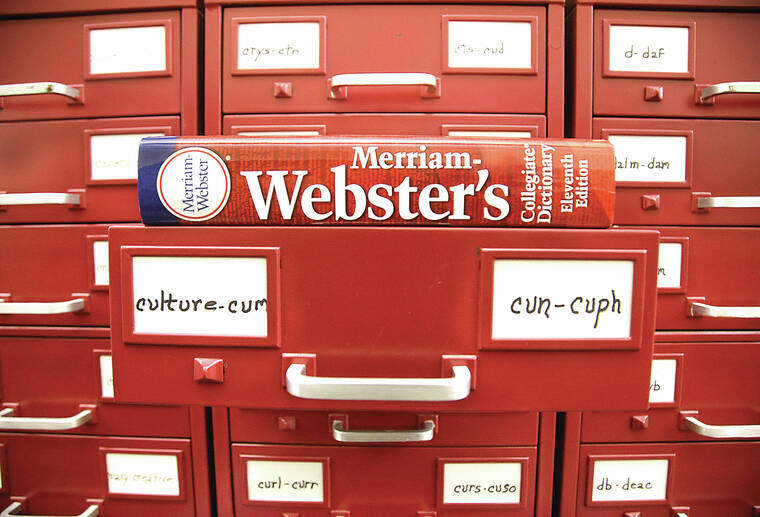What’s Merriam-Webster’s word of the year for 2023? Hint: Be true to yourself
NEW YORK — In an age of deepfakes and post-truth, as artificial intelligence rose and Elon Musk turned Twitter into X, the Merriam-Webster word of the year for 2023 is “authentic.”
Authentic cuisine. Authentic voice. Authentic self. Authenticity as artifice. Lookups for the word are routinely heavy on the dictionary company’s site but were boosted to new heights throughout the year, editor at large Peter Sokolowski told The Associated Press in an exclusive interview.
“We see in 2023 a kind of crisis of authenticity,” he said ahead of Monday’s announcement of this year’s word. “What we realize is that when we question authenticity, we value it even more.”
Sokolowski and his team don’t delve into the reasons people head for dictionaries and websites in search of specific words. Rather, they chase the data on lookup spikes and world events that correlate. This time around, there was no particularly huge boost at any given time but a constancy to the increased interest in “authentic.”
This was the year of artificial intelligence, for sure, but also a moment when ChatGPT-maker OpenAI suffered a leadership crisis. Taylor Swift and Prince Harry chased after authenticity in their words and deeds. Musk himself, at February’s World Government Summit in Dubai, urged the heads of companies, politicians, ministers and other leaders to “speak authentically” on social media by running their own accounts.
“Can we trust whether a student wrote this paper? Can we trust whether a politician made this statement? We don’t always trust what we see anymore,” Sokolowski said. “We sometimes don’t believe our own eyes or our own ears. We are now recognizing that authenticity is a performance itself.”
Merriam-Webster’s entry for “authentic” is busy with meaning.
There’s “not false or imitation: real, actual,” as in an authentic cockney accent. There’s “true to one’s own personality, spirit or character.” There’s “worthy of acceptance or belief as conforming to or based on fact.” There’s “made or done the same way as an original.” And, perhaps the most telling, there’s “conforming to an original so as to reproduce essential features.”
“Authentic” follows 2022’s choice of “gaslighting.” And 2023 marks Merriam-Webster’s 20th anniversary choosing a top word.
The company’s data crunchers filter out evergreen words like “love” and “affect” vs. “effect” that are always high in lookups among the 500,000 words it defines online. This year, the wordsmiths also filtered out numerous five-letter words because Wordle and Quordle players clearly use the company’s site in search of them as they play the daily games, Sokolowski said.
Sokolowski, a lexicologist, and his colleagues have a bevy of runners-up for word of the year that also attracted unusual traffic. They include “X” (lookups spiked in July after Musk’s rebranding of Twitter), “EGOT” (there was a boost in February when Viola Davis achieved that rare quadruple-award status with a Grammy) and “Elemental,” the title of a new Pixar film that had lookups jumping in June.
Rounding out the company’s top words of 2023, in no particular order:
RIZZ: It’s slang for “romantic appeal or charm” and seemingly short for charisma. Merriam-Webster added the word to its online dictionary in September and it’s been among the top lookups since, Sokolowski said.
KIBBUTZ: There was a massive spike in lookups for “a communal farm or settlement in Israel” after Hamas militants attacked several near the Gaza Strip on Oct. 7. The first kibbutz was founded circa 1909 in what is today Israel.
IMPLODE: The June 18 implosion of the Titan submersible on a commercial expedition to explore the Titanic wreckage sent lookups soaring for this word, meaning “to burst inward.” “It was a story that completely occupied the world,” Sokolowski said.
DEADNAME: Interest was high in what Merriam-Webster defines as “the name that a transgender person was given at birth and no longer uses upon transitioning.” Lookups followed an onslaught of legislation aimed at curtailing LGBTQ+ rights around the country.
DOPPELGANGER: Sokolowski calls this “a word lover’s word.” Merriam-Webster defines it as a “double,” an “alter ego” or a “ghostly counterpart.” It derives from German folklore. Interest in the word surrounded Naomi Klein’s latest book, “Doppelganger: A Trip Into the Mirror World,” released this year. She uses her own experience of often being confused with feminist author and conspiracy theorist Naomi Wolf as a springboard into a broader narrative on the crazy times we’re all living in.
CORONATION: King Charles III had one on May 6, sending lookups for the word soaring 15,681% over the year before, Sokolowski said. Merriam-Webster defines it as “the act or occasion of crowning.”
DEEPFAKE: The dictionary company’s definition is “an image or recording that has been convincingly altered and manipulated to misrepresent someone as doing or saying something that was not actually done or said.” Interest spiked after Musk’s lawyers in a Tesla lawsuit said he is often the subject of deepfake videos.


